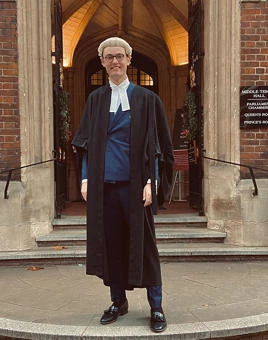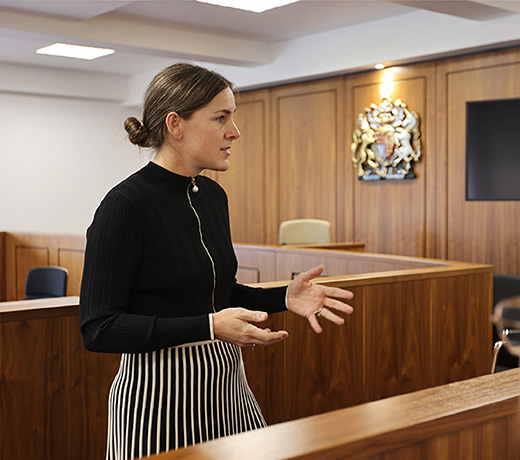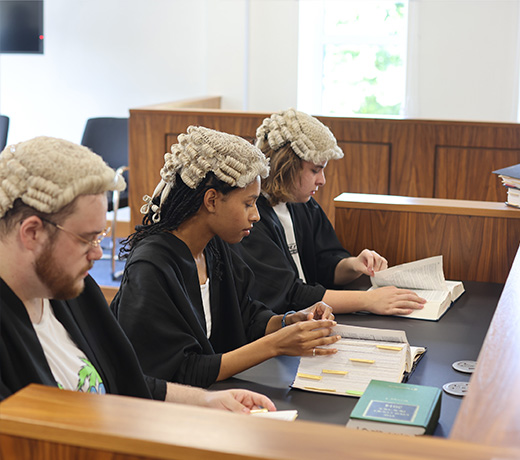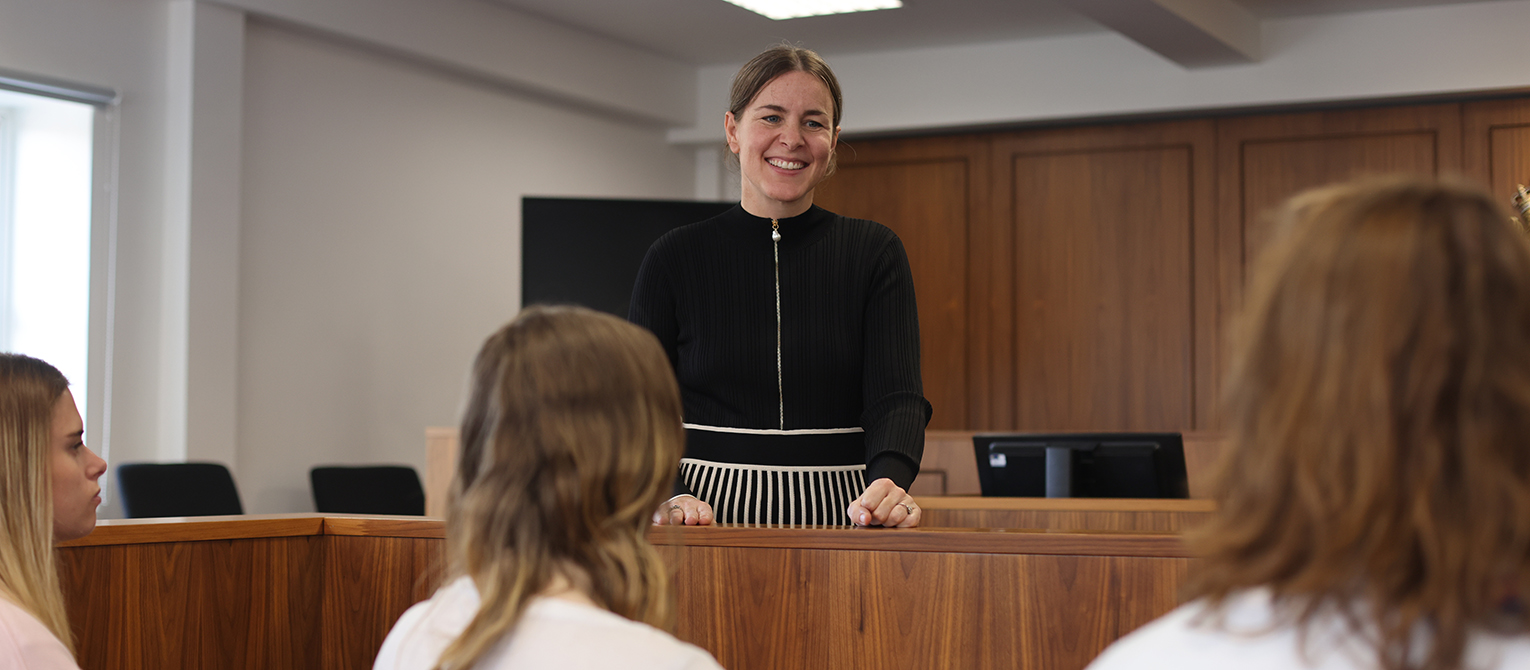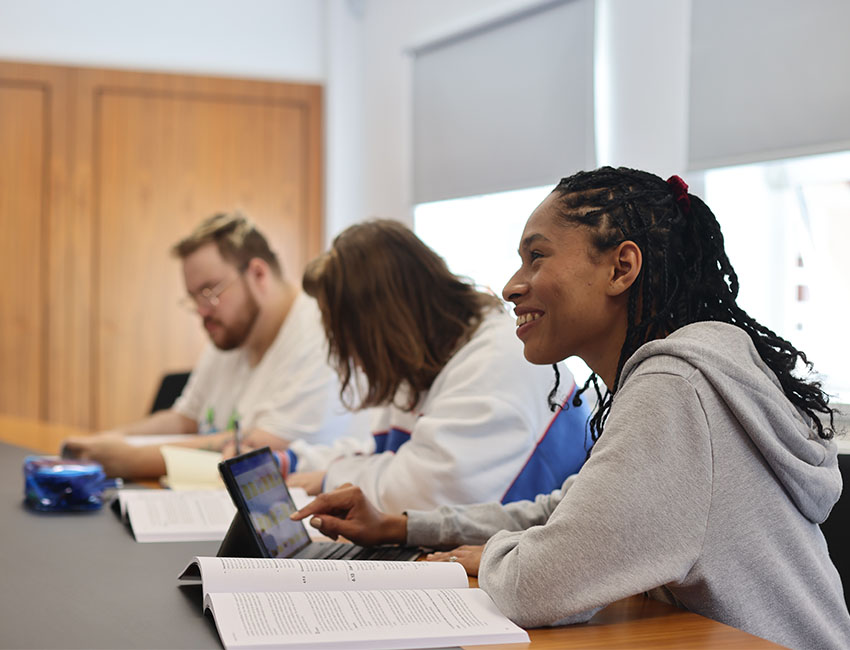Choose which parts of Law you most want to study, with modules in Family Law, Human Rights Law, Employment Law and much more at Worcester. You and your classmates will work together to simulate mock hearings to gain authentic experience of a legal setting in our replica courtroom. You'll also network with solicitors, barristers and judges, who offer placements and deliver guest lectures, so you can test and polish the skills you're developing in a professional setting.
of students are in work and/or study 15 months after graduating
of student agree staff are good at explaining things
University of the Year finalist
Recognised for our graduate success, we’re shortlisted for University of the Year in the Times Higher Education Awards 2025.
Overview
In your first year, you’ll study modules in Contract Law, Public Law and Criminal Law, while developing your knowledge of the fundamental aspects of the English and Welsh legal system and the way the law profession operates. As you progress through the course, you’ll be able to shape your studies around your own interests and career goals. There are lots of optional modules to choose from in your second and third years, with topics including commercial law, human rights law, law of evidence and medical law and ethics.
At Worcester, assessment is not all about written assignments and exams. You’ll also be assessed on your legal knowledge through oral presentations, research projects and role-play activities in our mock courtroom.
You’ll join a community of law students, all based together in the centre of Worcester, a short walk away from the city’s courts and several local law firms. You’ll learn from our expert academic team, recent graduates and a network of high-profile legal professionals, including the Resident Judge of Hereford and Worcester.
If you decide to pursue a career as a solicitor, the LLB will provide you with a solid grounding for your future preparation for Stage 1 of the Solicitors Qualification Examination (which is required by the Solicitors Regulation Authority). Should you choose to become a barrister, the LLB will also provide a solid foundation for your potential future studies on the Bar Professional Training Course (as required by the Bar Standards Board).
By the time you graduate, you will have plenty of practical experience with courtroom etiquette, case working skills and legal procedures.
Placements
Pro bono activity is built into the course, giving you the chance to work alongside practising solicitors and develop your legal skills while making a genuinely positive contribution to society. You can also choose to complete an optional work-based placement in your third year, at an approved legal organisation such as a solicitor’s firm, a barrister’s chambers, or within our Legal Advice Clinic.
Discover Law at Worcester
Course content
You will study a mix of mandatory and optional modules during your time at Worcester.
All first-year modules are mandatory and will introduce the core areas of the subject, develop practical and transferable skills, and enable you to explore different areas of law before choosing to specialise in your second and third years.
We regularly review our courses to reflect the latest research and developments in the subject area, as well as feedback from students, employers and the wider sector. As a result, modules may change to ensure the course remains current and relevant.
Optional modules will run if enough students choose to study them. It is not guaranteed that all modules will be offered every year.
Careers
Many people choose to study law because they want to make a difference in society, but may not know exactly what area they’d like to work in. That’s why we give you the chance to explore lots of different specialisms, from commercial law, criminal law and family law to human rights and international law.
While you’re exploring these areas and the opportunities they can lead to, we’ll work with you to develop the professional skills needed for a successful career. The Law School’s dedicated employability team run a regular Careers Café, where you can drop in to get CV support, chat about applications or practice interview techniques. Mooting and mock trials within the course help you learn how to project your voice and exude confidence – highly valuable skills. You can also choose to complete an optional work placement module in your final year.
Law Careers
Our Law degree could be the first step towards your career as a:
- Solicitor
- Barrister
- Crown Prosecutor
- Legal Executive
- Paralegal
Other Career Options
Studying Law at Worcester is a great way to develop your analytical, critical thinking, and communication skills. The transferrable skills you’ll gain are desirable to employers from all sectors and can open doors to career paths you may not have considered, including:
- Police Detective
- Civil Servant
- Compliance Officer
- Teacher
- Law Lecturer
- Human Resource Professional
Opportunities to progress
Opportunities to progress on to a postgraduate qualification at Worcester, including Legal Practice LLM and Law MPhil/PhD.
Student case studies
Find out more about some recent Law LLB students.
Course highlights
Teaching and assessment
Evaluation is not all about written assignments and exams. You’ll also be assessed on your legal knowledge through oral presentations, research projects and role-play activities.
You’ll take part in a variety of learning methods, from interactive lectures, workshops and seminars to practical experiences in our purpose-built facilities and real-world legal settings.
Teaching and assessment contents
During this Law degree, you are taught through a combination of interactive lectures, seminars, workshops and practical courtroom exercises. Interactive lecture sessions take a variety of formats and are intended to enable the application of learning through discussion and small group activities. Seminars enable the discussion and development of understanding of topics covered in lectures, and wider activities – such as those within the mock courtroom – are focused on developing subject specific skills and graduate skills.
In addition, meetings with Personal Academic Tutors are scheduled on at least four occasions in the first year and three occasions in each of the other years of a course.
The University places emphasis on enabling students to develop the independent learning capabilities that will equip them for lifelong learning and future employment, as well as academic achievement. A mixture of independent study, teaching and academic support from Student Services and Library Services, and also the Personal Academic Tutoring system enables students to reflect on progress and build up a profile of skills, achievements and experiences that will help them to flourish and be successful.
Meet the Law team
Meet some of the Law team that you will learn from.
Entry requirements
UCAS tariff points required: 120
| Qualification | Grade |
|---|---|
| A-level | BBB |
| BTEC National Extended Diploma | DDM |
| T-level | Merit |
We do accept Access to HE Diplomas and other qualifications which may not exactly match the combinations above. Work out your estimated points with the UCAS tariff calculator.
Any questions?
If you have any questions about entry requirements, please call our Admissions Office on 01905 855111 or email admissions@worc.ac.uk.
Fees
Fees contents
UK and EU students
In 2026/27 the standard fee for full-time home and EU undergraduate students on BA/BSc/LLB degrees and FdA/FdSc degrees is £9,790 per year.
Tuition fees are reviewed annually and may increase each year for both new and continuing students.
For more details on course fees, please visit our course fees page.
International students
In 2026/27 the standard tuition fee for full-time international students enrolling on BA/BSc/LLB degrees and FdA/FdSc degrees is £17,200 per year.
Tuition fees are reviewed annually and may increase each year for both new and continuing students.
For more details on course fees, please visit our course fees page.
How to apply
How to apply contents
Applying through UCAS
UCAS is the central organisation through which applications are processed for full-time undergraduate courses in the UK.
Read our how to apply pages for more information on the application process, or if you’d like to apply for part-time study.
Law LLB (Hons) - M100
Contact
If you have any questions, please get in touch. We're here to help you every step of the way.

Admissions Office
admissions@worc.ac.uk01905 855111More to explore
Open Days
Visiting us is the best way to get a feel for student life at the University of Worcester.

The City of Worcester
Worcester is a welcoming university city with great transport links and plenty of student parking.

Accommodation
Benefit from our accommodation guarantee. We have rooms on campus to suit every budget including en-suite options.



